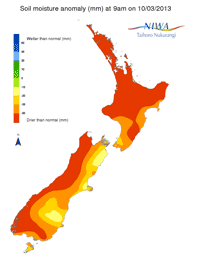 Australia may have had an extraordinary “Angry Summer“, but New Zealand’s been having a bit of a cracker too. Prolonged warm and sunny weather over much of the country has driven North Island soil moisture deficits to levels not seen for at least 70 years (see map at left). Official drought status — which means farmers are eligible for various forms of government assistance — has been declared in Northland, South Auckland, Coromandel, Bay of Plenty, Waikato, and Hawke’s Bay. The Manawatu and Rangitikei regions have also asked government for drought status. Most of the North Island is also subject to total fire bans — another first for this dusty summer. Preliminary estimates of economic losses are already heading towards $1 billion.
Australia may have had an extraordinary “Angry Summer“, but New Zealand’s been having a bit of a cracker too. Prolonged warm and sunny weather over much of the country has driven North Island soil moisture deficits to levels not seen for at least 70 years (see map at left). Official drought status — which means farmers are eligible for various forms of government assistance — has been declared in Northland, South Auckland, Coromandel, Bay of Plenty, Waikato, and Hawke’s Bay. The Manawatu and Rangitikei regions have also asked government for drought status. Most of the North Island is also subject to total fire bans — another first for this dusty summer. Preliminary estimates of economic losses are already heading towards $1 billion.
Stuff.co.nz noted the obvious climate connection:
Long, dry spells are forecast to double by 2040 as temperatures continue to rise and New Zealand heads towards a more Mediterranean climate.
Experts warn it could spell the end for farming as we know it and may cost the country billions of dollars in drought relief each year before practices are adjusted.
“This is historic,” said climate scientist Jim Salinger, who has calculated that the amount of rain needed for grass growth was the highest since records began. “It’s like comparing your income against expenditure in your cheque book. And we are in deficit.”
Continue reading “Till your well runs dry: NZ drought hits record levels”

 Christopher, Viscount Monckton of Brenchley’s tour of Australia must be going very badly, because the “
Christopher, Viscount Monckton of Brenchley’s tour of Australia must be going very badly, because the “ This op-ed by climate scientist Jim Salinger first appeared in print editions of the New Zealand Herald last Tuesday.
This op-ed by climate scientist Jim Salinger first appeared in print editions of the New Zealand Herald last Tuesday. Saturday’s New Zealand Herald carried
Saturday’s New Zealand Herald carried